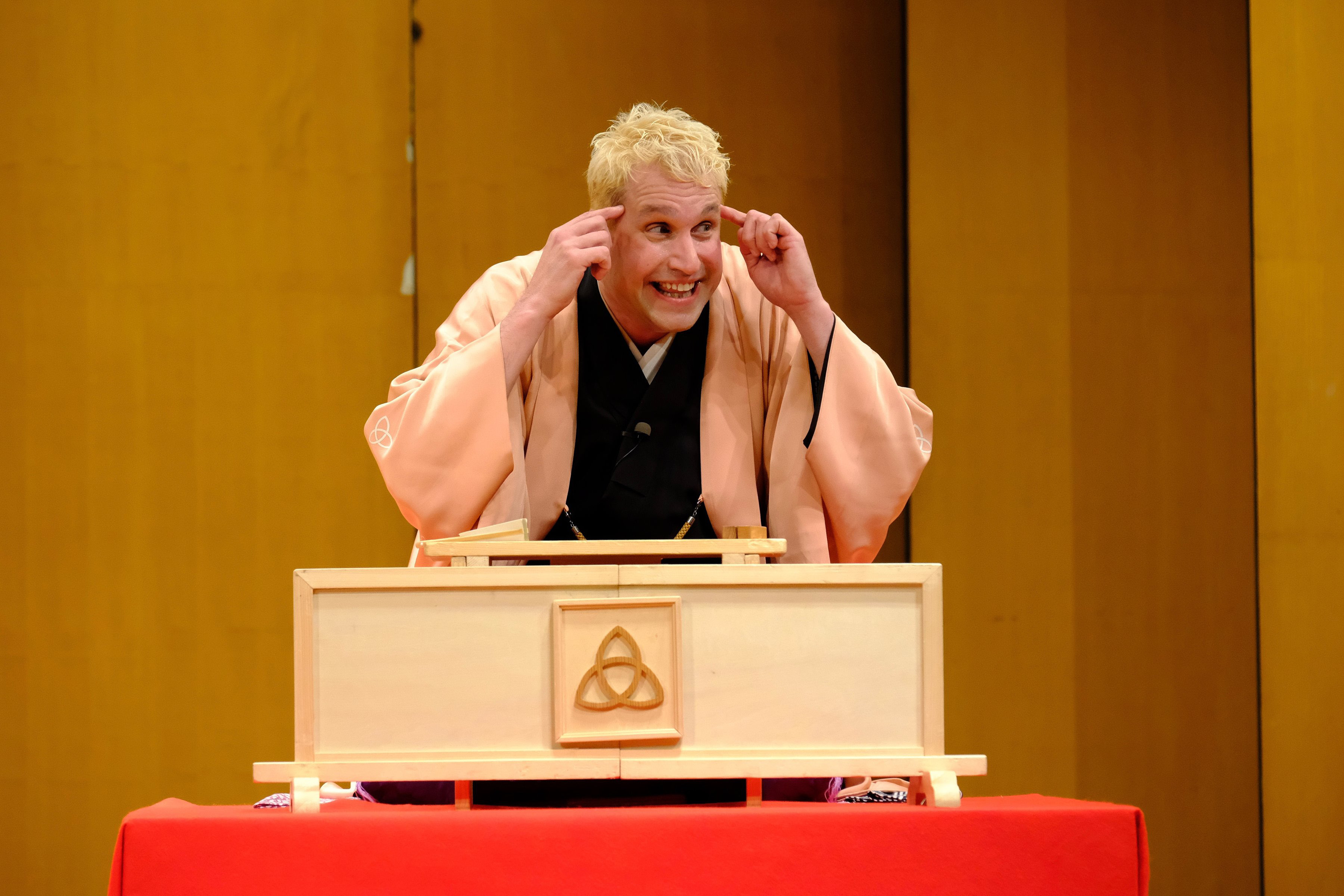Susan Elkin meets up with a colourful Rakugo story teller to find out more about this traditional Japanese art form.
Katsura Sunshine, 47, is a big blond Canadian who usually strides round London in a kimono and top hat although when I meet him he’s wearing jeans and a flowery shirt. Sunshine is a story teller in the Japanese Rakugo tradition. He’s recently completed a ten-show run at Leicester Square Theatre and has a similar run at Soho Theatre in off-Broadway, New York in November.
It’s a very specific form of story telling in which the first half of the story (“the pillow” in Japanese) sets the scene and the second half leads to a punchline, known as a fall in Japanese. Rakugo means falling word.
Sunshine’s name was given to him by his Master, Katsura Bunshi VI under whom Sunshine served a three-year apprenticeship and remains a permanent part of the Katsura professional “family”.
He explains how it works: “The other apprentices and I had to get his meals, do his laundry and then support him in the theatre – which means lighting, sound, stage management, costumes”. The deal – deeply rooted in the Japanese way of working – includes full subsistence for the apprentice plus a stipend. Sunshine is one of 22 apprentices who form the Katsura family or guild.
Now he is allowed to use his Master’s 270 stories and a bank of about 300 traditional ones. If he wants to use stories of any other Master he has to seek specific permission. Today there are around 800 qualified Rakugo story tellers, about 40 of whom are now women – a fairly recent development.
Sunshine, who has about 20 to 25 stories in his personal repertoire, is one of a tiny handful who translates the originals verbatim into another language. The name “Sunshine” was given him by his Master and is a pun in English on the Japanese for three branches.
So how on earth did a Toronto classics graduate, who parents were from Slovenia, get involved with Rakugo? “After university, I wrote plays and once had a 15-month run with my version of a play by Aristophanes”, he says, “And I read academics who pointed out the fundamental similarities between Greek and Japanese traditions.”
When he was 29 he decided to go to Japan and see for himself. “I had just a few months’ eligibility left for a working holiday visa so I seized the opportunity and flew to Tokyo trying to master a few words of basic Japanese during the flight”.
It was love at first sight. “Canada is a very young country and although some people try quite hard to keep traditions going it all has to be very deliberate. In Japan, which is an ancient civilisation – whether it’s flowers, kimono wearing, calligraphy or dramatic forms such as Rakugo – it just happens naturally as part of every day life and that just blew me away.” He stresses that the traditions sit alongside Japan’s modern take on being one of the world’s most highly developed nations.
He learned the language as he went along and performs a lot in Japan in the original language. He remains a Canadian national though and uses visas and working permits because Japan allows no form of dual nationality. He also performs in Britain, North America and (in French) in France and north Africa. “I get quite a lot of invitations from cultural attachés, which usually involves a single show and some school visits” he says.
And that’s another thing about Rakugo. It is almost entirely innocent of sexual innuendo and contains so swearing so it really is family entertainment. “One of my greatest joys is seeing and hearing children laugh at the same thing their parents are laughing at. It’s a sharing form of comedy which allows family members to bond through something they’re all enjoying together”. He laughs that the naughtiest things which ever happens in Rakugo is a story about a woman who hides a young man in the cupboard when she hears her husband coming – a time honoured, multicultural comic situation if ever there was one.
Rakugo started 400 hundred years ago and is thought to have originated in the humorous anecdotes which occurred in the sermons of Buddhist monks. “Not that those stories of Rakugo drive any kind of moral point. They’re just funny” adds Sunshine. After the end of the Edo period in the late nineteenth century Rakugo moved into dedicated theatre spaces.
“It still adheres to centuries-old theatrical traditions” explains Sunshine. “For example, if someone is knocking on a door the performer looks to the left. When someone comes in though a door you look to the right and the audience learns to read that sort of thing instinctively.”
Since all this will sound like minority entertainment to many Brits, I ask Sunshine whether he makes a living out of Rakugo or whether he also has to do something else to pay the bills. “Oh yes!” he declares warmly. “A pretty good living too.”
Katsura Sunshine is already planning his 2018 run at Leicester Square Theatre. Meanwhile you might catch him at UK-based Japanese festivals or in small venues.



